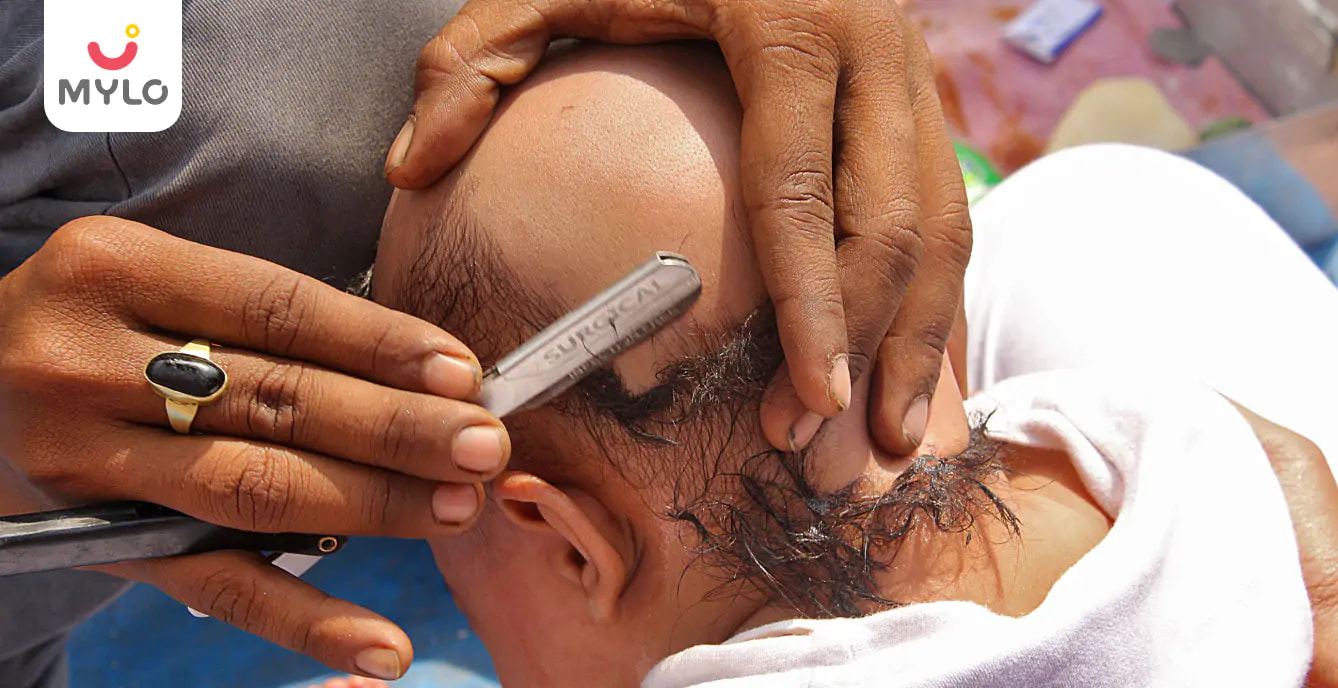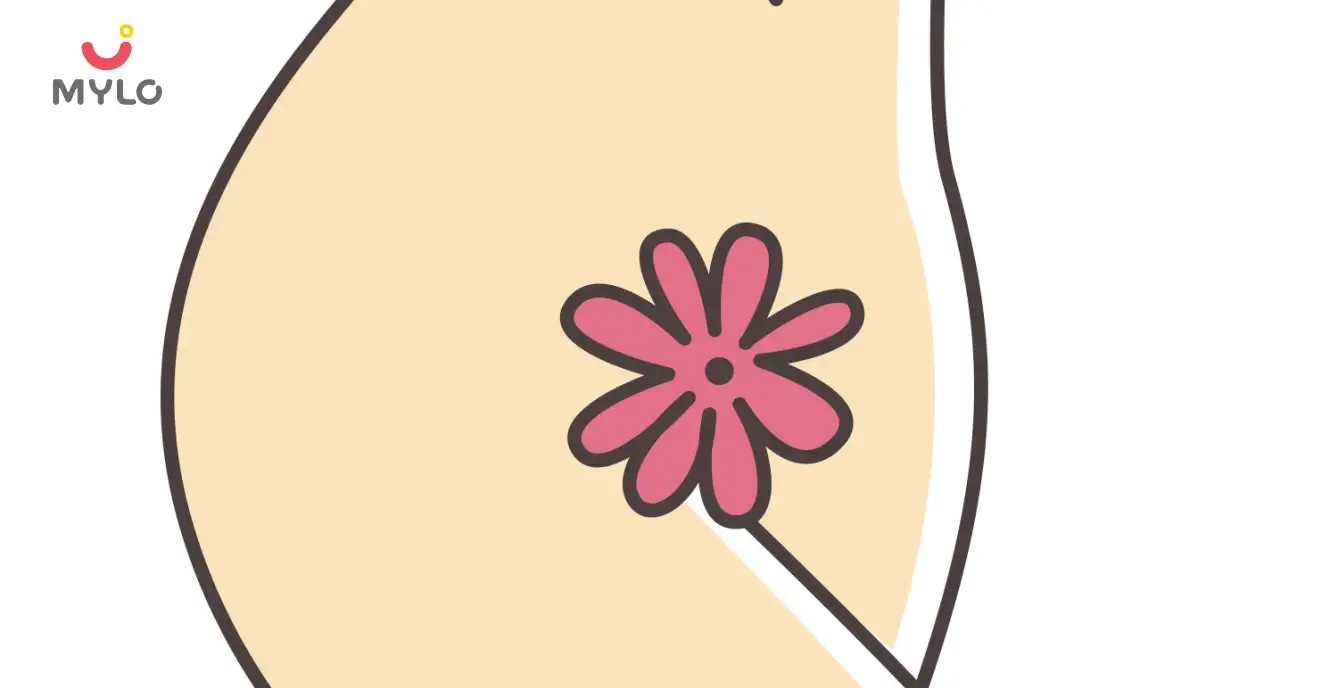Home

Care for Baby

Mundan Ceremony: A New Parent's Guide to Customs, Traditions and Celebrations
In this Article

Care for Baby
Mundan Ceremony: A New Parent's Guide to Customs, Traditions and Celebrations
Updated on 19 September 2023
The Mundan Ceremony is a time-honored tradition and much more than just your baby’s first haircut. It is believed to cleanse the child's body and soul, protect them from the evil eye, and bestow blessings for a prosperous future. In this comprehensive guide, we'll explore the customs, traditions, and celebrations surrounding a baby Mundan ceremony, providing new parents with invaluable insights and tips for this auspicious occasion.
Mundan Meaning
The Mundan, also known as the Chudakarana or Tonsure ceremony, is an important Hindu ritual where a baby's first haircut takes place. This sacred ritual involves shaving off the baby's first hair, symbolizing the beginning of a new chapter in their life. It is one of the significant milestones in a child's life and holds immense cultural and religious significance in India.
The term "Mundan" is derived from the Sanskrit word "Munda," which means "shaved head." This ceremony is believed to cleanse the child of any negativity from their past life and promote the healthy growth of hair. It is a joyous occasion that is celebrated with enthusiasm and devotion by parents and family members.
You may also like: Annaprasan: Baby’s First Rice Eating Ceremony
What is the Importance of Baby Mundan Ceremony?
Let us now understand why baby Mundan holds so much importance in the Indian culture:
1. Cultural Significance
The ceremony has deep cultural roots in Indian tradition. It is believed to mark the beginning of a child's journey towards spirituality and purity. By removing the hair, which is considered impure, the child is believed to be cleansed and ready to embrace a new phase of life.
2. Health Benefits
According to Ayurveda, the ancient Indian system of medicine, Mundan helps stimulate blood circulation in the scalp, promoting the growth of healthy hair. It is also believed to enhance the child's overall well-being and protect them from various ailments.
3. Symbol of Renunciation
The baby Mundan is also seen as a symbolic act of renunciation. By shaving off the hair, the child is believed to detach from materialistic attachments and focus on spiritual growth. It is a way of teaching the child the value of simplicity and humility.
4. Family Bonding
The ceremony is an occasion that brings the entire family together. It is a time of celebration and joy, where relatives and friends gather to bless the child and offer their support and love. It strengthens family bonds and creates lasting memories.
5. Traditional Beliefs
Many families believe that the baby Mundan ceremony brings good luck and wards off evil spirits. It is believed to protect the child from the influence of negative energies and ensure their well-being. Following this age-old tradition is seen as a way of honoring ancestors and seeking their blessings.
You may also like: 7 Amazing Ways to Help Your Toddler Talk
What are the Customs and Traditions Associated with Baby Mundan?
Let us now understand the customs and traditions associated with Mundan:
1. Ganapati Puja
Before the ceremony, families often perform a Ganapati Puja, seeking the blessings of Lord Ganesha, the remover of obstacles. This ritual is believed to ensure a smooth and auspicious ceremony.
2. Charity
As an act of gratitude and compassion, it is customary for the parents to donate a certain amount of money, clothes, or food to the less fortunate. This practice is believed to bring blessings and good karma to the child.
3. Ritual Bath
Before the haircut, the child is given a ritual bath to purify their body and soul. This signifies the cleansing of any impurities and prepares the child for the ceremony.
4. Barber's Role
The role of the barber is crucial in the Mundan. The barber, traditionally referred to as "nai," is considered a symbol of purity and is believed to possess the ability to remove negative energies. The parents carefully select a trusted barber to perform the haircut.
5. Feast and Celebrations
After the ceremony, a grand feast is organized to celebrate the occasion. Family members and friends come together to share delicious food and sweets. It is a time of joy and celebration, where everyone showers their blessings and good wishes upon the child.
You may also like: Temper Tantrums: Meaning and How to Manage
How to Choose the Right Mundan Muhurat in 2023?
Selecting an auspicious Mundan muhurat is essential to ensure a successful and harmonious ceremony. Here are some tips to help you choose the right Mundan muhurat 2023:
1. Consult an Astrologer
Seek guidance from an experienced astrologer who can analyze the child's birth chart and recommend auspicious dates for the Mundan. Astrologers consider various factors such as planetary positions, zodiac signs, and lunar phases to determine the most favorable muhurat.
2. Panchang
Refer to the Hindu Panchang, a traditional calendar that provides information about auspicious dates and times for various ceremonies. The Panchang takes into account planetary movements and other celestial events to determine favorable muhurats for different rituals.
3. Family Traditions
Consider your family's customs and traditions while choosing the Mundan muhurat. Some families have specific dates or months that hold special significance, such as birthdays or anniversaries. Aligning the baby Mundan ceremony with these important dates can add an extra layer of meaning to the occasion.
4. Availability and Convenience
Take into account the availability and convenience of family members and close relatives. Choose a date and time that allows everyone to participate in the ceremony without any major conflicts. Ensure that the selected muhurat is practical and feasible for all involved.
You may also like: Loss of Appetite in Babies: Meaning, Causes & Tips to Improve
Step-by-Step Guide to Performing a Mundan Ceremony
Performing a Mundan requires careful planning and adherence to traditional rituals. Here is a step-by-step guide to help you navigate through the process:
1. Purify the Space
Cleanse the space where the ceremony will take place. Decorate it with flowers, rangoli (traditional patterns), and auspicious symbols like swastika. This creates a positive and sacred atmosphere.
2. Ganapati Puja
Begin the ceremony by performing a Ganapati Puja. Invoke Lord Ganesha and seek his blessings for a successful ceremony. Offer flowers, incense, and sweets to the deity, and recite prayers and mantras.
3. Ritual Bath
Give the child a ritual bath using turmeric and other auspicious ingredients. This bath symbolizes purification and prepares the child for the Mundan. Dress the child in new clothes.
You may also like: Baby Growth: When Do Growth Spurts Occur in Babies?
4. Mundan Ritual
Seat the child comfortably on a decorated chair or a special Mundan stool. The barber, along with the parents, performs the Mundan ritual by shaving off a lock of the child's hair. This is done in a gentle and loving manner, ensuring the child's safety and comfort.
5. Charity and Blessings
After the ritual, offer prayers and seek the blessings of elders and family members. Perform a small charity act, such as donating money or food, to express gratitude and share the joy of the occasion.
6. Feast and Celebrations
Conclude the ceremony by organizing a feast for family and friends. Serve delicious food and sweets, and celebrate the child's milestone with joy and happiness. Take this opportunity to create lasting memories and cherish the bond of love and togetherness.
You may also like: Baby Milestones: A Week-By-Week Guide to Your Baby’s Development in the First Year
Tips for a Successful Baby Mundan Ceremony
Here are some tips to help you carry out the ceremony with ease:
1. Plan Ahead
Start planning for the Mundan well in advance. This includes choosing the right muhurat, making necessary arrangements, and informing family members and friends about the event. Planning ahead ensures a smooth and well-organized ceremony.
2. Seek Professional Help
If you are unfamiliar with the rituals and customs associated with the ceremony, consider seeking professional help. Hire an experienced priest or event planner who can guide you through the process and ensure that all rituals are performed correctly.
3. Safety First
Ensure the child's safety during the ceremony. Use child-friendly and safe tools for the haircut. Keep the child comfortable and calm throughout the ceremony. Prioritize their well-being above all else.
You may also like: A New Parent's Guide to Baby Language Skills
4. Capture Memories
The ceremony is a precious moment in your child's life. Capture this milestone by hiring a professional photographer or assigning a family member to take photographs and record videos. These memories will be cherished for years to come.
5. Enjoy the Experience
Above all, remember to enjoy the ceremony and the celebration surrounding it. Embrace the traditions, rituals, and customs with joy and enthusiasm. This is a beautiful occasion to bond with your family and celebrate the growth of your child.
You may also like: 6 Awesome Tips to Make Your Baby's First Birthday Party Memorable and Fun
Final Thoughts
The Mundan ceremony is an important and cherished tradition in Indian culture. It holds profound significance for new parents and their children. By understanding the meaning, customs, and traditions associated with the Mundan, parents can ensure a memorable and meaningful celebration for their child. From choosing the right muhurat to performing the rituals with devotion and love, every step of the baby Mundan is a testament to the rich cultural heritage of India.
References
1. Karthikeyan K. (2009). Tonsuring: Myths and facts. Int J Trichology.
2. Sitholey P, Agarwal V, Vrat S. (2013). Indian mental concepts on children and adolescents. Indian J Psychiatry.



Written by
Atreyee Mukherjee
Get baby's diet chart, and growth tips

Related Articles
Related Questions
Influenza and boostrix injection kisiko laga hai kya 8 month pregnancy me and q lagta hai ye plz reply me

Hai.... My last period was in feb 24. I tested in 40 th day morning 3:30 .. That is faint line .. I conculed mylo thz app also.... And I asked tha dr wait for 3 to 5 days ... Im also waiting ... Then I test today 4:15 test is sooooo faint ... And I feel in ma body no pregnancy symptoms. What can I do .

Baby kicks KB Marta hai Plz tell mi

PCOD kya hota hai

How to detect pcos

Related Topics
RECENTLY PUBLISHED ARTICLES
our most recent articles

PCOS & PCOD
Dates for PCOS: How to Harness their Health Benefits

PCOS & PCOD
Coconut Water for PCOS: Discovering the Natural Support You've Been Missing

Everything You Need to Know About the Length of Vagina

Male Infertility
Herbs for Male Fertility: Exploring Herbal Solutions for Male Reproductive Health

Diet & Nutrition
Is Banana Good for PCOS: A Comprehensive Guide to Understanding Their Relationship

Diet & Nutrition
Flax Seeds for PCOS: How This Superfood Can Improve Symptoms
- Shankhpushpi: Discover the Health Benefits of This Ancient Herb
- Chamomile: The Ultimate Guide to Discovering its Medicinal Properties and Health Benefits
- Endometrial Thickness in Pregnancy: Your Guide to Understanding What is Normal
- Hypomenorrhea: When Your Period is Lighter Than Usual
- Anti Mullerian Hormone Test: The Key to Early Detection of Fertility Issues
- Benefits of HSG Test: The Secret to Boosting Your Chances of Getting Pregnant
- Deviry Tablet Uses: How to Maximize The Benefits for Your Reproductive Health
- Endometrial Thickness for IVF: The Ultimate Guide to Successful IVF Outcomes
- Normal Endometrial Thickness: A Key Indicator of Female Fertility
- Uterine Artery Embolization: A Non-Invasive Solution for Fibroids
- Deviry 10mg for Menstrual Disorders: Is It the Right Choice for You
- Hyperprolactinemia: How High Prolactin Levels Can Affect Your Chances of Conception
- Myomectomy: A Comprehensive Guide to Uterine Fibroid Removal Surgery
- The Hormonal Dance: Understanding Which Hormones Regulate Menstrual Cycle


AWARDS AND RECOGNITION

Mylo wins Forbes D2C Disruptor award

Mylo wins The Economic Times Promising Brands 2022
AS SEEN IN

- Mylo Care: Effective and science-backed personal care and wellness solutions for a joyful you.
- Mylo Baby: Science-backed, gentle and effective personal care & hygiene range for your little one.
- Mylo Community: Trusted and empathetic community of 10mn+ parents and experts.
Product Categories
baby carrier | baby soap | baby wipes | stretch marks cream | baby cream | baby shampoo | baby massage oil | baby hair oil | stretch marks oil | baby body wash | baby powder | baby lotion | diaper rash cream | newborn diapers | teether | baby kajal | baby diapers | cloth diapers |




